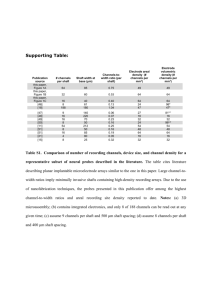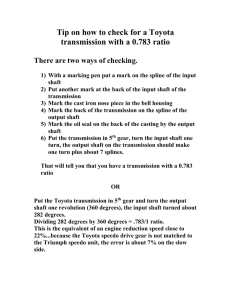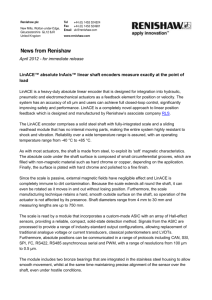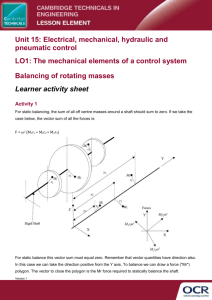Detailed Design Review
advertisement
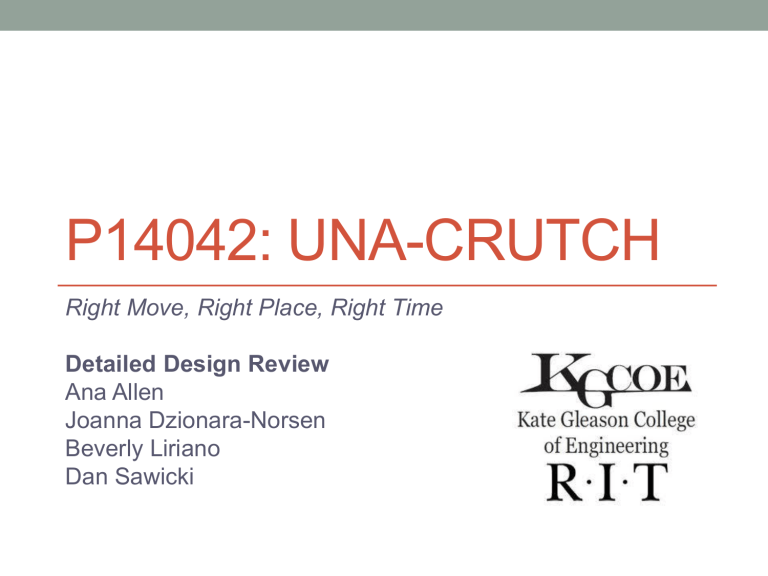
P14042: UNA-CRUTCH Right Move, Right Place, Right Time Detailed Design Review Ana Allen Joanna Dzionara-Norsen Beverly Liriano Dan Sawicki Agenda Review of Preliminary Detailed Design Review Review of Final Design • Features of Crutch • Materials • Cost Analysis Feasibility of Design • FEA Analysis • Buckling Analysis Review of Test Plan Project Plan MSD II REVIEW FROM PRELIMINARY DDR Crutch A Sliding button • Pros: • Lightweight • Easy to manufacture • Sliding button connective mechanism • Cons: • Design resembles standard axilla crutch Crutch B • Pros: • Aesthetically different from standard axilla crutch • Pads tested during user feedback • Cons: • Complicated to connect • Hard to Manufacture Notes from Preliminary DDR Notes from Preliminary DDR REVIEW OF FINAL DESIGN Revised Features of Connective Mechanism More Durable than Nylon Higher Strength Material such as Steel Alternate Connective Mechanism Postponement Bill of Materials Bill of Materials Axilla Pad Frame Axilla Pad Frame Pad Screws to connect Axilla Pad frame to shaft Shafts Handle Frame Handle Frame Pad Female Button Block Male Button Block Pin to connect/adjust handle frame to shaft Screws to connect shaft to Base connection Base Connection Height Adjustment Shaft Button for Height Adjustment Tip Brinkman Lab Parts Bill of Materials Bill of Materials Axilla Pad Frame Axilla Pad Frame Pad Screws to connect Axilla Pad frame to shaft Shafts Handle Frame Handle Frame Pad Female Button Block Male Button Block Pin to connect/adjust handle frame to shaft Screws to connect shaft to Base connection Base Connection Height Adjustment Shaft Button for Height Adjustment Tip Bar Stock Bill of Materials Bill of Materials Axilla Pad Frame Axilla Pad Frame Pad Screws to connect Axilla Pad frame to shaft Shafts Handle Frame Handle Frame Pad Female Button Block Male Button Block Pin to connect/adjust handle frame to shaft Screws to connect shaft to Base connection Base Connection Height Adjustment Shaft Button for Height Adjustment Tip Pins/ Screws/ Buttons FEASIBILITY OF DESIGN The Six Key Components of the Una-Crutch 2 1 Item Number Part 1 Shaft 2 Axilla Pad Frame 3 Adjustment Shaft 4 Tip 5 Handle 6 Base Connection 5 6 3 4 Source Function Engr. Requirement (metric) Unit of Measure Marginal Value Ideal Value 9 CR3, CR4 Minimizes deflection under maximum user weight for any crutch configuration (single and double) Deflection in 0.1 0.05 S2 9 CR3, CR4 Do not fracture or break under user load when weight is concentrated on one crutch or both crutches as a unit. User Weight lbs 200 300 215 lbs is average: + S3 9 User will be able to use the Una-Crutch without compromising comfort Comfort scale 2 1 Based off Comfort Pain Scale (1Best, 5-Worst) - S4 9 Slip Resistance N/A 0.75 1 + S5 9 Connectivity lbs 5 3 - S6 9 Short disconnect time Separability seconds 30 15 - S7 9 Crutch combination is not too heavy Weight lbs <7 <5 - S8 3 Appealing to the majority Design Appeal yes/no yes yes + S9 9 Adjust to fit users of varying heights Adjustability ft 5.2<h<5.8 4.8<h<6.4 - CR4, CR6, CR12 CR8, CR12 CR1, CR13 CR1, CR13 CR7 CR5, CR6, CR10 CR9, CR11 High coefficient of friction on normal surfaces Interfacing mechanism does not unlock due to user weight Desired Direction Importance S1 Comments/ Status Rqmt. # Engineering Requirements - Item 1: Shaft Shaft Characteristics Shaft Static FEA 𝐹 = 0 and no friction. • Material: 1060 Al Alloy • Assume • YS = 27.6 MPA • Load at Point 1, P=150lb due to E.R. #2. • Constraints: • Fixed at Point 2 • Roller at Point 1 Shaft Von Mises Stresses Max stress < YS, Thus no failure. Shaft Displacement Item 2: Axilla Pad Frame Axilla Pad Frame Characteristics Magnets TBD Analysis to be completed by Gate Review Axilla Pad Frame Static FEA 𝐹 = 0 and no friction. • Material: Nylon 6/10. • Assume • YS = 139 MPA • Distributed load of P=300 lb split across surface 1 due to E.R. #2. • Constraints: • Fixed at Holes 2 and 3. Axilla Pad Frame Von Mises Stresses Max stress < YS, Thus no failure. Axilla Pad Frame Displacement Item 3: Adjustment Shaft Adjustment Shaft Frame Characteristics Adjustment Shaft Static FEA • Assume 𝐹 = 0 and no friction. • Material: Al 1060. • YS = 27 MPA • Distributed load of P=300 lb at hole 1 due to E.R. #2. • Constraints: • Roller at Surface 2. • Fixed at Surface 3. Adjustment Shaft Von Mises Stresses Max stress < YS, Thus no failure. Adjustment Shaft Displacement Item 4: Tip Tip Characteristics Note: FEA Analysis neglected for Tip since part rests on Adjustment Shaft Item 5: Handle Handle Characteristics Handle Static FEA • Assume 𝐹 = 0 and no friction. • Material: Nylon 6/10. • YS = 139 MPA • Distributed load of P=300 lb along Surface 1 due to E.R. #2. • Constraints: • Fixed at Shaft Surface 2. • Roller at Shaft Surface 3. Handle Von Mises Stresses Max stress < YS, Thus no failure. Handle Displacement Item#6 Base Connection Base Connection Characteristics Base Connection Analyses 3 • Material: Nylon 6/10. • YS = 139 MPA • Constraints location 1,1a, and 2 are fixed • Load of 300lb were places locations 3 and 3a 1 1a 2 3a Base Connection Von Mises Stresses Max stress < YS, Thus no failure. Base Connection Displacement Buckling • Components and Materials: • Shafts: Aluminum • Base Connection: Nylon 6/10 • Adjustment Shaft: Aluminum • Assumptions: • Half round cross-section and half round hollow cross-section • Pin-pin • Use Euler formula: Buckling Results • For no buckling to occur, load applied must be less than the critical load • Shafts: Load Applied (lb) Critical Load (lb) Buckle? Yes/No 150 283 No Load Applied (lb) Critical Load (lb) Buckle? Yes/No 300 334 No Load Applied (lb) Critical Load (lb) Buckle? Yes/No 300 1641 No • Base Connection: • Adjustment Shaft: PROJECT PLAN Gate Review Updated BOM Further Review of Axilla Pads • Magnet Analysis • Material Revised Handle Frame Cost Analysis Further Review of Failure Modes MSD II Project Plan Task Name Duration Subsystem Level Prep/Build 11 days Subsystem Level Build/Test 15 days Subsystem & System Level Build/Test/Integrate 14 days System Level Build/Test/Integrate 16 days Verification & Validation 16 days Innovation Challenge Grant Application CAD Design and Analysis of Alternate Connective Mechanism Prototype of Alternate Connective Mechanism Start Finish Mon 1/27/14 Tue 2/11/14 Tue 3/4/14 Mon 3/24/14 Tue 4/22/14 Mon 2/10/14 Mon 3/3/14 Fri 3/21/14 Mon 4/14/14 Tue 5/13/14 Prototype of Crutch A User Feedback of Altered Connective Mechanism and Crutch A Prototype QUESTIONS? Thank you everyone! BACK UP SLIDES Source Function Engr. Requirement (metric) Unit of Measure Marginal Value Ideal Value 9 CR3, CR4 Minimizes deflection under maximum user weight for any crutch configuration (single and double) Deflection in 0.1 0.05 S2 9 CR3, CR4 Do not fracture or break under user load when weight is concentrated on one crutch or both crutches as a unit. User Weight lbs 200 300 215 lbs is average: + S3 9 User will be able to use the Una-Crutch without compromising comfort Comfort scale 2 1 Based off Comfort Pain Scale (1Best, 5-Worst) - S4 9 Slip Resistance N/A 0.75 1 + S5 9 Connectivity lbs 5 3 - S6 9 Short disconnect time Separability seconds 30 15 - S7 9 Crutch combination is not too heavy Weight lbs <7 <5 - S8 3 Appealing to the majority Design Appeal yes/no yes yes + S9 9 Adjust to fit users of varying heights Adjustability ft 5.2<h<5.8 4.8<h<6.4 - CR4, CR6, CR12 CR8, CR12 CR1, CR13 CR1, CR13 CR7 CR5, CR6, CR10 CR9, CR11 High coefficient of friction on normal surfaces Interfacing mechanism does not unlock due to user weight Desired Direction Importance S1 Comments/ Status Rqmt. # Engineering Requirements - Customer Requirements Customer Rqmt. # Importance CR1 9 Description Comments/Status Is adjustable to users of various heights Comfort CR2 9 CR3 9 Ergonomically friendly to the user A single crutch can support the load of a user Durability CR4 9 Design product to last CR5 3 Low cost of production is absolute CR6 3 CR7 3 Aesthetically appealing CR8 9 An interfacing mechanism allows for easy coupling and uncoupling of the two independent crutches Marketability Versatility Commercially marketable CR9 9 Can be used outdoors and indoors CR10 3 Lightweight crutch assembly CR11 9 CR12 3 Ease of Use Accommodate user daily functions Intuitive assembly and disassembly Risk Analysis # Risk L S I Action to Mitigate Action to Remediate 1 Crutches (used individually or connected) will not support the user 2 3 6 Perform stress analysis for many different materials Deformed crutch piece can be easily accessed and replaced 2 Connective mechanism failure 2 3 6 Perform stress and dynamic analysis for different load configurations Redesign connective mechanism 1 3 3 Simulate possible force distribution Choose material with higher coefficient of friction 2 2 4 Conduct surveys with multiple prototypes Redesign including ergonomic issue 4 Crutch will lack slip resistance on some surfaces Crutches will cause discomfort to the user 5 User load will force crutch to buckle 1 3 3 Design and computationally test the crutch with a material with a high elastic modulus Create a back-up design or a means of strengthening the crutch frame 6 User treats crutch as a toy 2 2 4 High factor of safety - test crutch in all combinations of loading Strengthen the material 7 Handle snaps due to user force 2 2 4 Make handle with high elastic modulus New handle can be placed on unit (adjustable handles will be interchangeable) 8 The device will be too expensive to manufacture 1 2 2 Design Una-Crutch with common manufacturing techniques - research manufacturing Return and reconsider to manufacturing process analysis 9 A team member leaves the team 1 3 3 Team communication to resolve issues Reconsider the customer requirements and deliverables 10 Design is not patentable 3 1 3 Patent research and brainstorming Reconsider project deliverables 2 3 6 Conduct surveys with prototypes while standing on one foot (simulate injury) Reconsider product concept idea / discuss with customer to refocus the target group 1 2 2 Reduce sharp surfaces in connective mechanism Reconsider connective material/design 2 3 6 Test stair clearance Redesign to accommodate small spaces 3 11 12 13 User cannot connect the two crutches while immobilized on one leg User gets pinched when connecting crutches User does not feel comfortable using crutch on stairs Prototype Test Plan Final Model Test Plan Final Model Test Plan (continued) Backup Slide: Shaft Strain Backup Slide: Axilla Pad Strain Backup Slide: Adjustment Shaft Strain Backup Slide: Handle Strain
